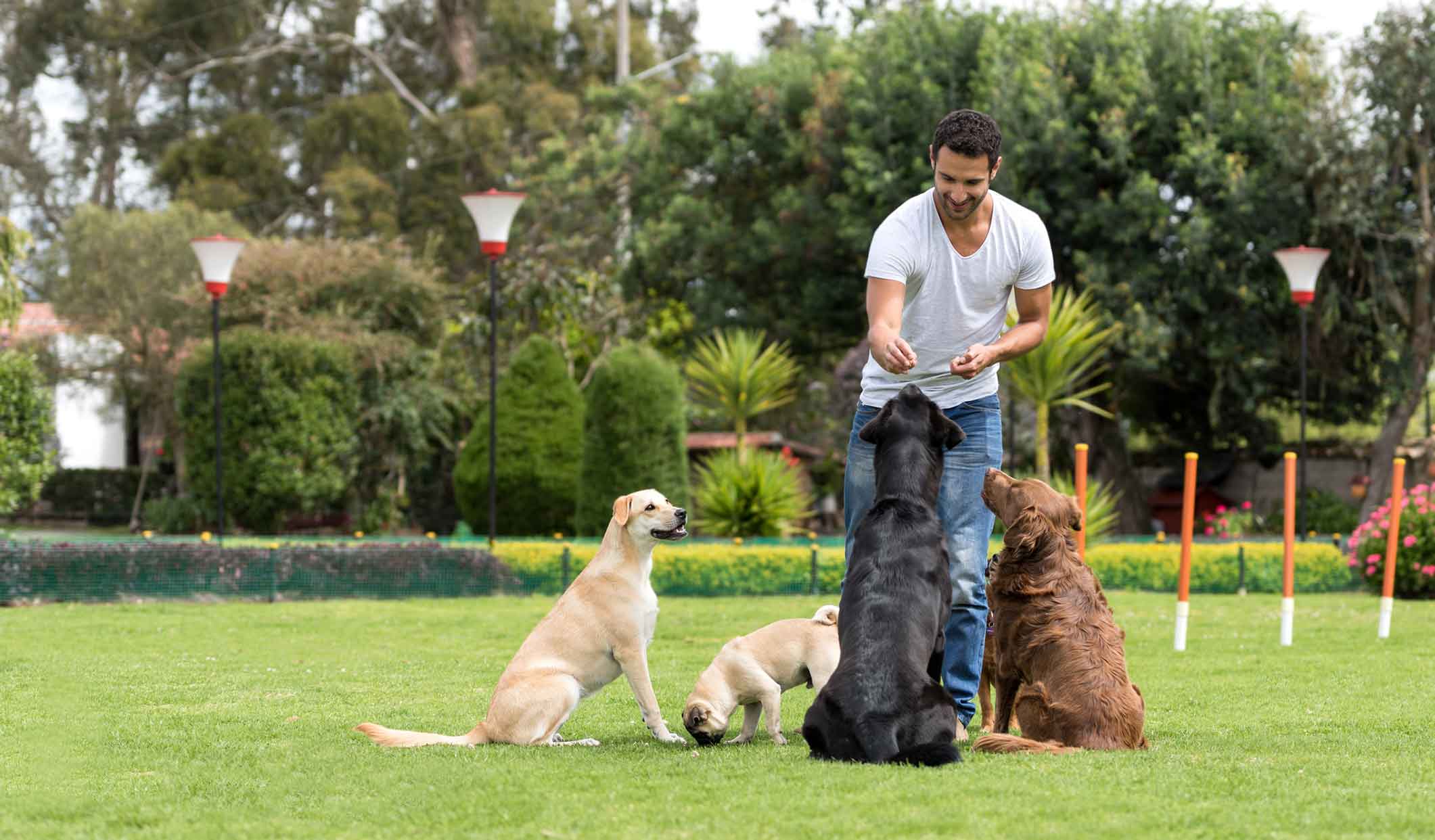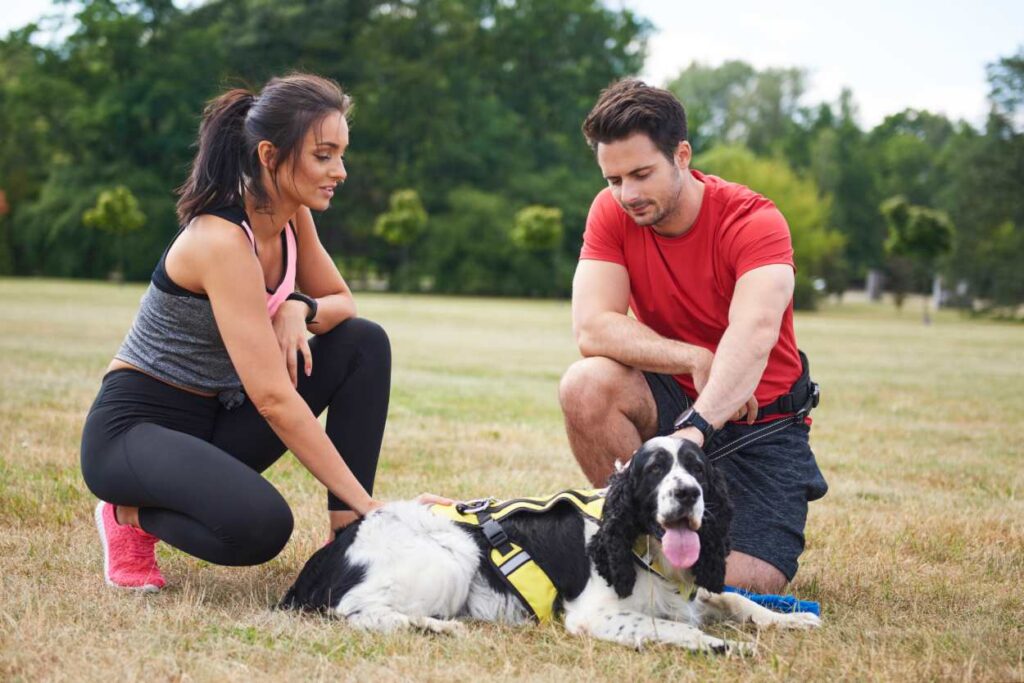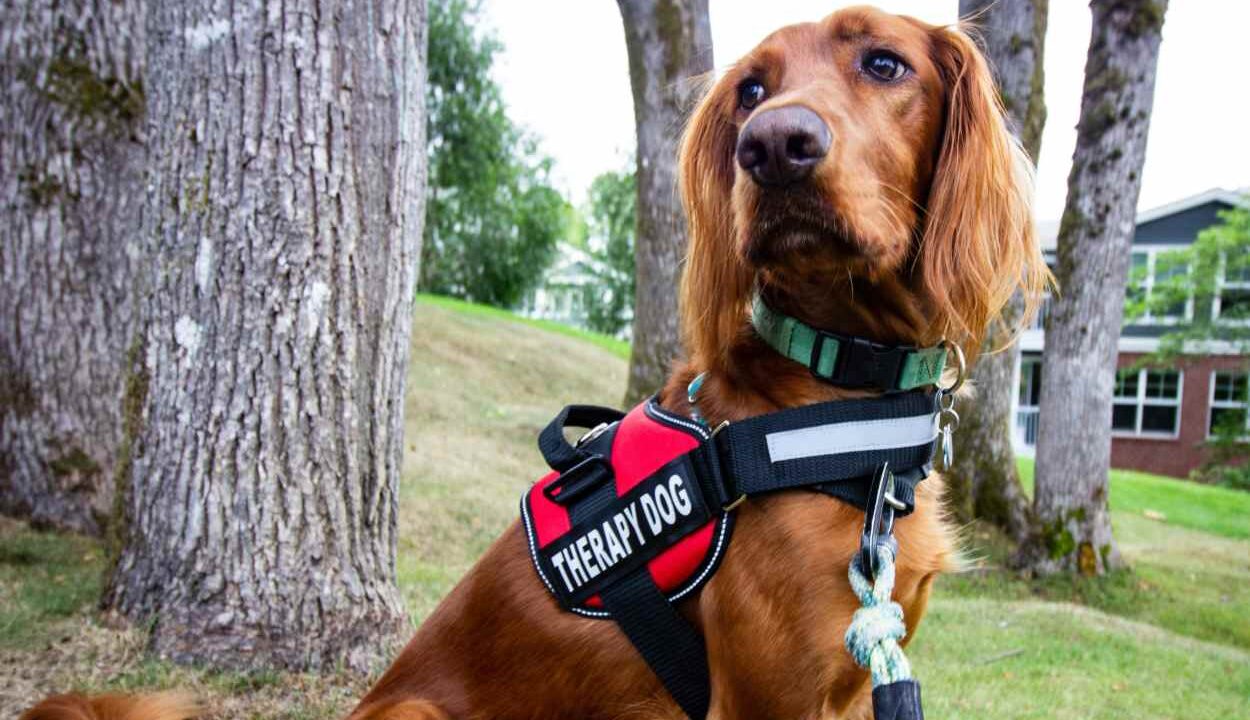Table of contents
Table of contents
If you’re already a dog trainer, or perhaps still in training yourself, you’ll know how rewarding it is to help dogs and their owners build stronger bonds. But have you ever considered offering therapy dog training as part of your services?
Therapy dogs aren’t assistance dogs or guide dogs – they don’t live with someone to support them with a disability – but they do play a hugely important role in society. And with demand for therapy dogs on the rise here in the UK, it could be a fantastic addition to your business.
Let’s take a look at what therapy dog training involves, why it’s becoming so popular, and what you need to know if you’d like to add it to your portfolio.
What is therapy dog training?
First things first: what exactly is a therapy dog? A therapy dog is a pet dog, owned by an individual, who has the right temperament and training to provide comfort and support in settings like hospitals, care homes, schools, or even workplaces. They don’t have special legal access rights like assistance dogs – instead, they’re invited into these environments to brighten up people’s day, reduce stress, or provide calm companionship.
Think of a golden retriever in a care home, bringing back memories for residents who had dogs growing up.
They have also become popular with anxious children and young people, helping to provide a calming influence, more than a family pet.
Therapy dog training is all about preparing both the dog and the owner for these types of situations. It focuses less on obedience drills and more on socialisation, calm behaviour, and developing the right attitude for public interaction.
Get Dog Training Insurance

The rise in demand for therapy dogs
Over the last few years, there’s been a real shift in how we think about mental health and wellbeing – not just on an individual level, but in schools, workplaces, and healthcare settings too. Alongside this shift, the role of therapy dogs has started to shine more brightly than ever before.
The pandemic played a big part in this change. Lockdowns left many people feeling isolated and anxious, and our relationships with animals became even more important. For some, having a dog at home was a lifeline. For others, visits from a therapy dog once restrictions lifted were a welcome source of comfort and connection.
It’s not just about “feeling good” either – there’s a growing body of research showing that time spent with animals can help lower stress levels, reduce blood pressure, ease loneliness, and even encourage social interaction. That means therapy dogs are no longer seen as a nice extra, but as a genuine part of wellbeing strategies in many organisations.
Mental health awareness is growing, and more organisations are exploring animal-assisted interventions to help combat stress, anxiety and loneliness.
NHS hospitals and care homes are often happy to receive therapy dog visits, recognising the benefits they bring to patients and staff alike.
Even corporate workplaces are beginning to explore therapy dog visits to boost staff wellbeing.
For trainers, this means there’s a real opportunity. Dog owners are looking for ways to give their pets a “job” with purpose, while organisations are eager to partner with trusted professionals.
Why therapy dog training could be a valuable extra service

So, why should you, as a trainer, consider adding therapy dog training to your services? Aside from the obvious feel-good factor, there are some very practical reasons why it makes sense for your business.
It diversifies your business
Most trainers offer the standard range of services – puppy socialisation, recall, lead walking, and perhaps a few behavioural consultations. Therapy dog training gives you something different to add to that list. It positions you as a specialist in a growing niche and helps you stand out in what can often feel like a crowded market.
If a dog owner is comparing trainers and sees you offer therapy dog preparation alongside the basics, it’s a clear point of difference.
It broadens your client base
Not every owner wants their dog to compete in agility or flyball – some are looking for a purposeful way to share their pet with others. Owners who’ve heard about therapy dog work are often very motivated, and they’ll actively seek out trainers who can guide them through the process.
By offering this service, you’re tapping into a client base that’s both highly engaged and often willing to invest in the right support.
It’s rewarding
Let’s be honest – there’s nothing quite like seeing the joy a therapy dog brings when they walk into a room. Knowing that the dogs you’ve trained are making a real difference – whether that’s calming a nervous child in a school library or brightening the day of someone in hospital – is incredibly fulfilling.
For many trainers, this becomes one of the most rewarding parts of their work. It’s not just about teaching sit and stay; it’s about contributing to community wellbeing in a tangible way.
It builds partnerships
Therapy dog work often involves collaborating with organisations like schools, charities, and NHS trusts. By offering this service, you’re not just building relationships with individual owners – you’re opening doors to professional partnerships. That might mean delivering training workshops for a local care home, supporting a university wellbeing programme, or linking up with charities that place therapy dogs.
These connections can raise your profile, expand your reach, and even lead to further business opportunities.
What you need to become a therapy dog trainer
The good news is you don’t need to retrain completely. If you’re already a qualified trainer or on your way there, you have a strong foundation. But therapy dog training does require some extra skills:
Strong grasp of canine body language – you’ll need to spot signs of stress and make sure dogs are coping well in busy environments.
Patience with handlers. Remember, you’ll often be guiding everyday owners who want to train their family pets as therapy dogs.
Good communication skills. You’ll also be working with institutions (schools, hospitals, charities) and need to explain what therapy dogs can – and can’t – do.
Essentially, you become a coach not just for the dog, but for the handler as well.
Qualifications & training pathways

There’s no single “therapy dog trainer” qualification in the UK – but there are several routes you can take to add credibility and knowledge.
For example:
- Dog training certifications: IMDT (Institute of Modern Dog Trainers), APDT UK (Association of Pet Dog Trainers UK), or PACT.
- Specialist courses: Some universities and providers offer Animal Assisted Intervention (AAI)
- Canine first aid courses: Always useful, especially when working in public spaces.
- Behaviour and welfare CPD: The more you understand about stress signals and welfare, the better.
It’s also a good idea to familiarise yourself with therapy dog charities and organisations in the UK, such as:
- Pets As Therapy (PAT)
- Therapy Dogs Nationwide
Both assess and register dogs (and their handlers). As a trainer, your role may be to help owners prepare for these assessments.
Regulations and considerations
Because therapy dogs don’t have the same status as assistance dogs, there are a few important things to be aware of if you’re planning to offer therapy dog training.
Understanding these areas will help you guide owners responsibly and protect both your business and the dogs themselves.
No automatic public access rights
Unlike assistance dogs, therapy dogs don’t have the legal right to accompany their owners everywhere. They can’t walk into a supermarket, restaurant, or office just because they’re wearing a vest. Instead, therapy dogs must be invited into specific environments, such as a hospital ward, school classroom, or care home lounge.
This means part of your role as a trainer is helping owners understand the difference and manage expectations. It’s about preparation for invited visits, not unlimited public access.
Insurance is essential
Whenever dogs and people are brought together in a structured setting, there’s a level of risk to consider. That’s why having the right dog trainer insurance is a necessity. As a trainer, you’ll need public liability insurance (to cover accidents involving people, dogs, or property) and professional indemnity insurance (to cover the advice or training you provide).
Owners who want to register with therapy dog charities may also need to prove they have appropriate cover. Guiding them through this can add real value to your service.
Safeguarding policies
Therapy dogs often work with vulnerable groups: children, elderly people, or adults with additional needs. This brings safeguarding responsibilities. In many cases, handlers may need a DBS check before visiting schools or care facilities.
Welfare first
Perhaps the most important consideration of all is the welfare of the dog. Under the Animal Welfare Act 2006, every dog has the right to be protected from stress, discomfort, and harm. Therapy work should never push a dog into situations that make them anxious, overwhelmed, or unhappy.
A calm, confident dog who enjoys human interaction is a good candidate; a nervous or reactive dog is not. Your responsibility as a trainer is to help owners see these differences and prioritise their dog’s wellbeing above all else.
Becoming a therapy dog trainer…
Therapy dog training is more than a business opportunity – it’s a chance to make a genuine difference in people’s lives.
As a trainer, adding this service can open doors to new clients, partnerships, and rewarding experiences. With demand continuing to rise across the UK, now is the perfect time to explore it further.
So, whether you’re just starting your journey as a trainer or looking to expand your established services, consider therapy dog training. Not only will it enhance your business, but it might just change lives – both canine and human – along the way.
Get Dog Training Insurance from Protectivity
*Disclaimer – This blog has been created as general information and should not be taken as advice. Make sure you have the correct level of insurance for your requirements and always review policy documentation. Information is factually accurate at the time of publishing but may have become out of date.
Last updated by

















